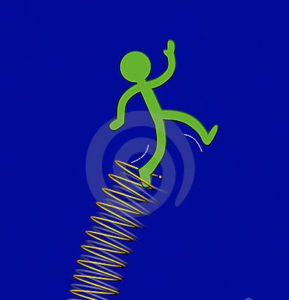March 6, 2024

Are you easily crushed by failure? Or do you shrug it off and continue on? I bet most of you would choose the latter but are often captured by the former.
Perhaps you need to learn how to become resilient.
But what is resilience?
One way of describing it is 'the power or ability to return to original form or position after being bent or deformed in some way.'
So how do you develop mental resilience, mental elasticity?
To that end, here are 20 ways you can boost your resilience. Do these regularly - make them a habit and they will reward you with long term, if not permanent resilience.
- Seek out sources of positive news. A couple of great web sites to check are http://www.dailygood.org/ and http://www.actionforhappiness.org.
- Start collecting inspiring quotes. For instance, go to http://brainyquote.com/ and type any inspiring concept into the search box. You can 'google' any concept with the word 'quote' after it and you will find many sites that collect quotes.
- Allow yourself to experience the negative emotions, but never dwell on them. Observe your internal feelings as if you are an onlooker. Say to yourself 'it'll pass,' and it surely will. Personally I have been doing this for the last 5 years or so and I know it works. I used to be a very angry person until I allowed myself to feel the anger and accept it for what it is. The same with other negative emotions as well.
- Create a mantra or regular saying, also known as an affirmation. Put it on to a 3x5 index card and carry it around with you everywhere. It should be something like: "Even in the face of uncertainty, I move forward with confidence, strength and love."
- Do something physical such as going for a run, lifting some weights or playing a set of tennis. This allows your body to dissipate emotional energy. If you do it on a regular basis (e.g. every day) the body has a regular 'energy purification' activity.
- Do an imagination exercise:
- Close your eyes and take some slow, deep breaths.
- Think back to a time in your life when you are able to cope with a stressful or other negative situation.
- What did you do, or what did you say to yourself that created the resilience?
- What did you learn from the situation?
(Note, the answers don't need to come to you immediately - just accept within yourself that you did find an answer then, and that it will come to you eventually.)
- When ready, open your eyes and breathe normally. - Talk with someone you trust, including a life coach. Having meaningful and honest conversations with others improves connection with people and allows you to get answers to questions that you may not have thought of.
- Return the favor: if someone you know is undergoing upheaval, talk to them and have a conversation. When that person appreciates your empathy and compassion, you are rewarded by becoming more resilient yourself. There will be a bond created that will strengthen the both of you.
- Regularly 'unplug' from life - allow yourself time to recharge. Perhaps take a long, self indulgent hot bath, or go for a long walk and connect with nature, etc.
- Think of someone you know who is incredibly resilient. Arrange to have a conversation with them about it. The questions you should ask should be along the lines of: 'how do you cope with X, 'What do you believe about X'. You will learn a lot just by this interview!
- Practice mindfulness and/or meditation. If you are religious, extend this to prayer. Mindfulness is a practice similar to meditation, but which focuses your awareness on the present moment. For an excellent book on this, see 'Mindfulness For Beginners' by Jon Kabat-Zinn. The audiobook version is a short exercise in practicing mindfulness.
- If you have experienced an upheaval, restart your regular daily life and get back into the swing of things. One of the things people need the most is regularity, and enforcing a bit of it will put you back on the track. To understand this more, check out the blog article 'Nothing Will Change Until You Do'
- Journaling. Many people who are regarded as resilient are also avid diarists. Journaling is a way of placing your thoughts in an external medium, and in the process they get organized in your mind. It helps you come to terms with any concept you are grappling with. If you journal regularly you have the benefit of regularity as well.
- Recognize that you are human and that you are as vulnerable as the next. We all have our weaknesses, as we do our strengths. Exercise 'self compassion' - in Christian terms, this is known as self forgiveness.
- Listen to some empowering music. Depending on your taste, it could be Beethoven's 'Song Of Joy' or the theme from 'Rocky' - whatever gets you pumped!
- Practice deep breathing. If you do meditation or mindfulness, this is part of the parcel. However it's good to do this at regular times of the day and week, outside of meditation and mindfulness.
- Remember, you're not alone. Recognise that others have experienced what you have and have bounced back - so you can too!
- Form a support group. There are plenty of places you can do this - meetup.com is a great example where you can meet people personally in your area.
- Take Action. The steps and tips outlined above will have no meaning if you do not take action. By action, I mean finding a small but concrete step to take to improve your resilience. It can be any of the steps I mentioned above. It can also be a step to remove you from any problem or upheaval.
- Create a schedule to regularise some of the steps above, such as an exercise schedule, healthy eating plan, etc. They need to become a part of who you are and thus need to be habituated.

"The Strongest Oak of the forest is not the one that is protected from the storm and hidden from the sun. It's the one that stands in the open where it is compelled to struggle for its existence against the winds and rains and the scorching sun."
- Napoleon Hill
